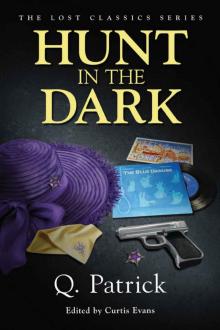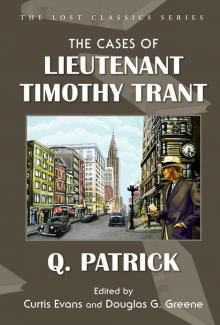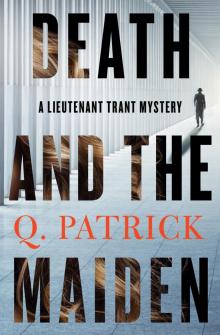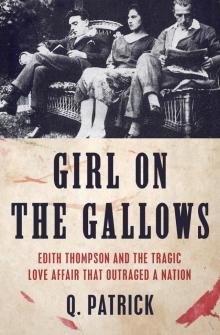- Home
- Q. Patrick
The Cases of Lieutenant Timothy Trant (Lost Classics) Page 6
The Cases of Lieutenant Timothy Trant (Lost Classics) Read online
Page 6
“Very considerate of him, I’m sure,” said Dave grimly, “but Minna never blackmailed me.”
“Never blackmailed you!” Yvonne’s voice quivered with indignation. “I’d like to know what you call it. Holding that court action over your head, saying...”
“There’s no need to bring it up, Yvonne.”
“Why not? Everyone thinks you double-crossed Minna, broke the engagement just because she had her face messed up in that accident. I’m sick and fired of having everyone think you’re a—a heel. Can’t you at least put yourself right with Leslie?”
There was something oddly moving to find about the girl’s white, impassioned face. There was something rather poignant about Dave too as he stood there, returning her fierce gaze, his lips twisted in a small, self-mocking smile.
For the first time since she had seen these two violent, independent young people together, Leslie realized just how deeply, almost hurtingly in love they were.
Dave turned to her abruptly. “Were you particularly fond of Minna?”
Leslie’s hands gestured. “Was anyone?”
“Then you might as well hear my little—saga.” Dave looked very pale and haggard now. “What I’m going to tell you gives me a dandy motive for murder. I realize that. But I guess you’re suspecting me anyway.”
He sat down next to Leslie. Yvonne dropped to the floor, slipping her hand in his. She looked like a rather beautiful wildcat play-acting at being a household pet.
“You know the beginning,” Dave began. “I made a fool of myself about Minna and before I could come up for air I found myself engaged to her. I don’t flatter myself she was in love with me. But you know how a guy is when he meets a girl like that. I built myself up as the coming young attorney; took her places I couldn’t really afford—just to put on dog. She got the idea I was much richer than I am, a comfortable financial port in a storm.”
He gave a short, mirthless laugh. “Oddly enough I didn’t mind at first. But then Yvonne started working on a new illustrated edition of The Story of Mark. She was always at Boyer’s house when I went there to pick Minna up after work. And from the first time I saw her, I was absolutely nuts about her.”
His eyes moved to Yvonne’s, and once again Leslie felt that almost electric current of emotion passing between them.
“I was a fool about that, too. Yvonne seemed so clever, so—so exciting. I hardly dared talk to her, let alone tell her the way I felt. I guess I ought to have broken with Minna right away. I meant to, but I kept putting it off. Sheer lack of will, I guess. But finally, even though I’d scarcely spoken two words to Yvonne, I just couldn’t take it any longer. I’d driven Minna out to the country for dinner and—well, I snuck out to the bar several times to fortify myself for the ordeal of letting her know we were through.”
“And I was crazy about him,” cut in Yvonne suddenly. “All the time I was crazy about him—the dope.”
Dave’s lips curled again in that grim smile. “It was just my bad luck that Minna had chosen that particular night to break some news to me. She had decided she was tired of being Robert Boyer’s secretary; she figured she’d learned all the tricks in the writing game and she was going to write a novel herself. She had everything planned out. I was to be her meal ticket while she was creating her great work. We were to be married right away; we were to start housekeeping in that house of mine.”
Dave flung out his hands. “That floored me all right. I still hadn’t told her about Yvonne. I wasn’t prepared. I told her I couldn’t afford to get married anyway, which was the truth. The house was rented at the time. I told her that if I had to give up that rent I wouldn’t have any income to support mother. It was all crazy. Her enthusiasm for me lessened quite a bit when she realized I was just a poor struggling young lawyer. But Minna was smart as a whip. I think she’d guessed about Yvonne; and she wasn’t going to let her get away with anything. She was determined to be a great novelist, determined to live in my house, and determined to marry me.”
He moistened his lips. “I know this makes me sound like a cur; but that was one of Minna’s prize tricks, making the other guy seem in the wrong. I kept on hitting the money angle; and she got me stopped on that, too. She said she’d have enough money for both of us. I knew she was almost broke and asked her what she meant. She was vague, but I didn’t like the way the thing smelled. She said something about having a lot of rich friends who would be only too glad to help her out—Gordy, Boyer, Faith and Harding. I’m not sure she didn’t even mention you, too.”
“Me!” Leslie stared. “You mean she hinted she was going to blackmail them?”
“I was too het-up at the time to realize anything. But that’s the way it struck me later. In any case, it was a devil of an evening. And, like a fool, I waited till the drive home before I sprang my bombshell about Yvonne.” His voice faltered. “Never tell a girl who wants to marry you that you’re in love with someone else, while you’re driving an automobile. It’s a bad habit. Minna turned tigress on me, nails and all. Unfortunately, she chose a particularly tricky corner to grab at my elbow. The next thing I knew I was in bed and a doctor was asking me how I felt.”
“You see,” broke in Yvonne fiercely, “it was Minna herself who has responsible for the accident. She got what was coming to her.”
“I’m only telling you this, Leslie,” said Dave quietly, “because I want someone to know the truth. I don’t blame Minna. Poor devil, she was the one who suffered.”
“Suffered!” echoed Yvonne. “I wouldn’t call it exactly suffering to chisel your house out of you in exchange for a few scratches on her face.”
“That,” muttered Dave, “is another thing. I don’t know what I’d have done, Leslie, if Boyer hadn’t helped with the hospital bills. I felt bad about it, naturally, but Minna’s attitude didn’t exactly inspire sympathy. When I went to see her in the hospital, she was still fighting mad. She said she’d take every cent I had. or might get, on a damage suit; she said she’d sooner see me dead than married to Yvonne. That was all a build-up to get the one thing she wanted, of course. And she got it. She got the house for as long as she wanted it—rent free.”
“And she made him fix up that studio for her too.” broke in Yvonne impulsively. “Made him spend hundreds of dollars in improvements. That’s why I said it was blackmail. It was. And it was worse, because she knew that by taking that house she made it impossible for Dave and me to get married. She did it just out of spite. She’s been sitting there all the time—gloating.”
Dave was looking straight at Leslie now, deep lines around his mouth. “You see now, maybe, that even if I was a heel, she ran me a good second. You see, too, just how much of a motive I might have had for murdering her.”
“But you didn’t have a motive! Neither of us did. Tell her the rest of the story.” Yvonne rose to her feet. “You heard Dave tell Lieutenant Trant that he had to telephone Minna yesterday. She’d wanted more work done on the studio and he just couldn’t afford it. He called to beg her to put it off for a while. That’s when she invited him to the party; that’s when she sprang her little surprise. She said she was giving the party to celebrate her book and, if things turned out the way she hoped, she wouldn’t need Dave’s house any more. She’d soon be moving to a more fashionable neighborhood.”
Leslie’s blue eyes rounded in amazement. She stared at Dave. “Is—is that true?”
“Sure. Of course, it might just have been a gag.”
Yvonne broke in: “When we heard she was dead at the party, I—I thought she’d killed herself.” She laughed. “That’s what I thought she’d meant by moving to a more fashionable neighborhood. But now that we know she was murdered, you must see how neither Dave nor I could have had a motive for shooting her. She was offering us our freedom. It was going to be possible for us to get married. Why should either of us have killed her when it was all going to be all right?”
That made sense, of course. If what they had told her was true, that cert
ainly made sense.
Leslie felt tired and unaccountably dejected. She had heard everything now. There was no point in staying. Her knees rather shaky under her, she rose and managed a faint smile.
“Well, I guess that’s that. Lieutenant Trant should be here soon, so make up your minds what you’re going to tell him.” She held out her hand impulsively. “And, Dave, I’m so glad to have heard the truth. It’s nice to know you were the person I always thought you were. Best of luck to both of you.”
As she moved to the door, she glanced at them over her shoulder. The two of them were standing very close together, white and haggard—staring after her.
* * *
Another taxi took Leslie downtown again to the theatre district. Her association with Robert Boyer and her status as Faith’s ex-roommate were open sesames at the Vandolan where The Story of Mark, produced, directed and adapted by Jim Harding, was still playing to standees.
Before going to the actress’s dressing room, she slipped into the wings for a moment to watch the end of the last act. It was a superb piece of theatre, and, though she had seen it numberless times, there was always a big thrill for her in the scene where Sally McCreedy had to choose between the two friends who loved her and finally chose—neither.
Faith, gorgeous in her eighteenth-century costume, was playing like a streak that night. It was as if the emotional jolt of the afternoon had let loose an even greater force of drama in her. It was an inspired performance.
When the curtain finally fell, Leslie slipped away to Faith’s dressing room. The actress’s dresser, an elderly woman, was bustling around. As Leslie heard the thunderous applause from the auditorium, she felt a little thrill of pride for Faith. Whatever might have happened in the past, Faith had worked hard for this; this was the life that was meat and drink for her, the life she deserved.
It was not particularly pleasant to have to break through all this glamour with the letter which Leslie was bringing.
Soon Faith swirled in, her radiant face reflecting the applause of the audience. But the instant she saw Leslie she stopped dead. A quick gesture dismissed the dresser, and she came to Leslie, taking her hands.
“Have they searched Minna’s house?” Her face was drawn and anxious now beneath the thick grease paint. “Tell me, have the police found—found anything?”
“Yes, darling, they found this.” Leslie handed her the letter from the parole board. “Lieutenant Trant asked me to give it to you. He’s coming around himself later.”
Faith stared blindly at the letter. “But why...” Leslie passed on to her the reasons Trant had given for his own magnanimity. She added: “You don’t have to tell me, darling. There’s no need for me to know anything.” Faith gave a short bitter laugh. “There’s nothing to know. It’s all so very, very simple. Faith Felton, Broadway’s latest dramatic find, served a jail term for theft. Until three months ago, Faith Felton had to sneak off every month to report to a parole officer. Lovely, lovely publicity.”
She broke off as the dressing-room door opened. Jim Harding came in, followed by Robert Boyer.
The author’s lean face lighted when he saw Leslie. He crossed to her side. Jimmy went straight to his wife and took her hands. In spite of their studied irony, his dark eyes could not conceal their admiration. “I have an actress for a wife,” he said softly. “Do you know that, darling? You’re an actress.” He stopped as he saw Faith’s expression, and asked sharply, “What’s the matter? Something wrong?”
Leslie put her hand on Robert’s arm, steadying herself, as the actress thrust the letter into her husband’s hand.
“Read it, Jimmy. You’d better know the truth Robert had better know too. The police just found this—a pleasant little by-product of Minna’s murder.”
Jim Harding took the letter in both hands, gazing at it for a protracted moment. Slowly he raised his quizzical, intelligent eyes. Watching him, in a queer moment of revelation, Leslie felt certain that he had known or guessed something of this all along.
He said: “What was it for, darling?”
Faith was staring straight at her own reflection in the tall mirror now. When she spoke it was with the cautious deliberation of someone who had rehearsed the situation in her mind long before.
“Listen, darlings—Jimmy, Robert, Leslie, you’re my three friends, the people I like best. I want you to know. Maybe when you do, you won’t be my friends any more. It’s a risk I’ve got to take because it’s worse this way.”
She looked down at her own slim, beautiful hands. “I don’t want to make excuses. But heaven knows, anyone who was born in that dreary little dump where I lived ought to be given a bit of a break. I was an orphan, you know, brought up by the charity of Minna’s aunt. And if you think Minna was awful, you should have known her aunt. As soon as I was old enough to graduate from housework, they landed me a job in the local department store— in ladies’ dresses. Eight dollars a week, seven of which went to Minna’s sainted aunt for back rent. The only thing that ever happened was once when the local schoolteacher got up some amateur dramatics and gave me the lead—Juliet, it was, and I shall never forget it.”
Faith ran her hand through her hair in a slight, forlorn little gesture. Leslie, standing close to Robert Boyer, realized that even then, when she was baring her soul, she was giving them a performance.
“From the moment I started studying the part I knew I was an actress, that there was nothing else in the world I would ever do. I lived and breathed Juliet. My performance was quite a riot even in Poole City, and I upset a travelling salesman from New York so much that he came backstage and hailed me as a Cornell, Duse and Bernhardt combined.”
She paused. “Naturally I believed him. I believed him next day when, over a chocolate soda at the drugstore, he told me he had a lot of friends on Broadway who could get me a job as easy as falling off a log. It was merely a question of the fare to New York, he said, and he was willing to pay that just for the honor of discovering a new star.”
She laughed harshly. “I was only seventeen, and a fool. If he hadn’t been just a little too anxious—I’d probably have gone with him. As it was, he went alone.”
A faint smile flickered over Jimmy’s face, but he did not speak.
“I was very, very virtuous,” said Faith, “but afterward I wished that I hadn’t been. It was worse when Minna went off to New York and later got a good job as Robert’s secretary. I wrote to her to help me get there too, but she never replied. And all the time, when there was a chance, I acted at the Poole City church hall, and every part I played, I knew, deep down inside me, that I was getting better and better. All I needed was the opportunity.”
She tossed back her hair. “And it came one day—it was a Saturday. The mayor’s wife came into the store to buy a fur coat in a hurry. I persuaded her to take a good one, at least one that in Poole City was considered fabulously opulent, and she actually paid spot cash. That was my opportunity and my temptation. No one had seen me make the sale. There were plenty of cheap-priced coats. I entered the sale as being for one of those and—kept the change. I thought, of course, they couldn’t check up on me till inventory time or at least I’d be safe until Monday.”
She sat down in front of the dressing table and started wiping cold cream into her face. “It was mad, of course. But I sneaked off that night. I carried my bag all the way to the next town where I wasn’t known and caught the midnight train East. I intended to send the money back, of course— just as soon as I had got a fat contract on Broadway.”
She shrugged. “They caught me getting off the train at Chicago. I shall never forget that ride back. It was worse than the trial when the pompous old judge gave me the maximum sentence as a warning to other young girls who get lured into crime by the tinsel glamour of the stage. It was worse even than the penitentiary itself; for there, at least, I had a chance to be alone and dream of the time when I would be free to act the parts I used to learn by heart in my spare time. Shakespeare’s allowed e
ven in prison, and I believe I could walk on tomorrow as Portia, Desdemona, Ophelia, without missing a single cue.
“I was so quiet and good they let me out on parole long before my time was up. It was pretty bad going back to Poole City and having the righteous local females shudder away from me. Luckily Minna’s aunt felt the disgrace as keenly as I, and finally listened to my pleas to be shipped off to New York where I would cease to be a burden to her. “I arrived in New York with less than ten dollars. I had nowhere else to go, so I went straight to Minna although she hadn’t answered any of my letters. Even so, I don’t think she would have taken me in if you, Leslie, hadn’t been an angel and offered to let me share your room. And it was you who actually introduced me to Robert and Jimmy, although Minna always took the honors later when I looked like making the grade. Remember the night you brought them round and Jimmy read the dramatic script of The Story of Mark? I shall never forget it. I made up my mind then and there that I was going to be Sally McCreedy or bust.”
Jimmy spoke for the first time then, as if he felt there had to be someone to break through the poignant mood of that story. He said dryly, “You notice it was the part she really wanted—not me.”
“Maybe at first.” Faith smiled. “I got them both, anyway. And everything would have been heaven if it hadn’t been for having to report every month to that probation officer. Minna knew everything, of course, from her buddies in Poole City. When that awful letter came, she managed to steal it and, even after I’d given up rooming with her, she never failed to call up regularly and remind me about it. She didn’t actually threaten me, though, until one day just before the accident and the bust-up with Dave Walker. Then she told me she was sick of being a mere secretary and had made up her mind to be a novelist. She suggested I’d want to show my gratitude to the family by helping her out. And like a fool I did help her out—every month to the tune of half my salary.”

 Death Goes to School
Death Goes to School Hunt in the Dark
Hunt in the Dark The Cases of Lieutenant Timothy Trant (Lost Classics)
The Cases of Lieutenant Timothy Trant (Lost Classics) Death for Dear Clara
Death for Dear Clara S.S. Murder
S.S. Murder Death and the Maiden
Death and the Maiden The Grindle Nightmare
The Grindle Nightmare Cottage Sinister
Cottage Sinister The Girl on the Gallows
The Girl on the Gallows